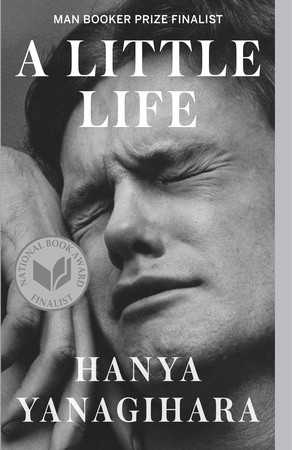The darkness, depth, and breadth of Hanya Yanagihara’s A LITTLE LIFE grab you and never let go from start to finish.
What sets it apart from most fiction is that this novel revolves around a horrific past and its lasting impacts while never once glossing over the trauma. It wields the suffering of its characters flawlessly. I am still haunted by these wonderful characters, and I don’t anticipate ever forgetting them. It is a true testament to the sheer lengths Yanagihara goes to in order to make us care about her characters and story.
The novel begins with Jude St. Francis moving to New York with his friends in his mid-twenties after graduating from (a Boston college assumed to be) Harvard. It is quickly revealed that he has a secret past that haunts him. Suffering painful spasms and crippling self-loathing, Jude turns to extreme self-harm to cope with his lifetime of sexual abuse. In this 700-page narrative that spans more than 30 years, Yanagihara revels in testing her characters and readers as she breaks Jude’s spirit down more and more as the novel progresses.
When Jude’s friends discover that every waking moment for Jude is pain and suffering, they struggle to support him. They don’t understand why he can’t heal from his past because he never shares with them the extremes he was forced to endure. As the years pass, they wonder how they can help him. Doesn’t he know that they love him? Doesn’t their friendship and bright future help his past fade away? Despite their support, Jude’s pain only worsens. As a victim of a series of horrors that are revealed as flashbacks throughout the novel, how could he believe he’s deserving of love when all he’s known is hate and abuse?
These feelings provide the main conflict of Yanagihara’s novel: If every waking moment is misery and torture, what is the point of living? Despite Jude’s past, which echoes throughout his daily life, there are some truly wonderful things that happen to him. He manages to find a family who loves him, and he and his friends experience a very privileged New York lifestyle, all of them exceling in their chosen career fields. But the question remains for Jude: Is it enough?
This story is such a success because it’s easy to empathize with every character’s perspective. Jude’s pain is so obvious. We understand why he believes his life is a waste, and, when the perspective changes to that of his friends, their love for Jude is just as clear. They can’t fathom why Jude doesn’t see his worth. It is this bond of friendship that provides the heart and soul of this novel.
With her complex characters and intriguing plot woven together with a writing style that handles gruesome horrors with outstanding empathy and beauty, Yanagihara has crafted a truly enduring novel that dares to ask if having only a little life is better than none at all.








